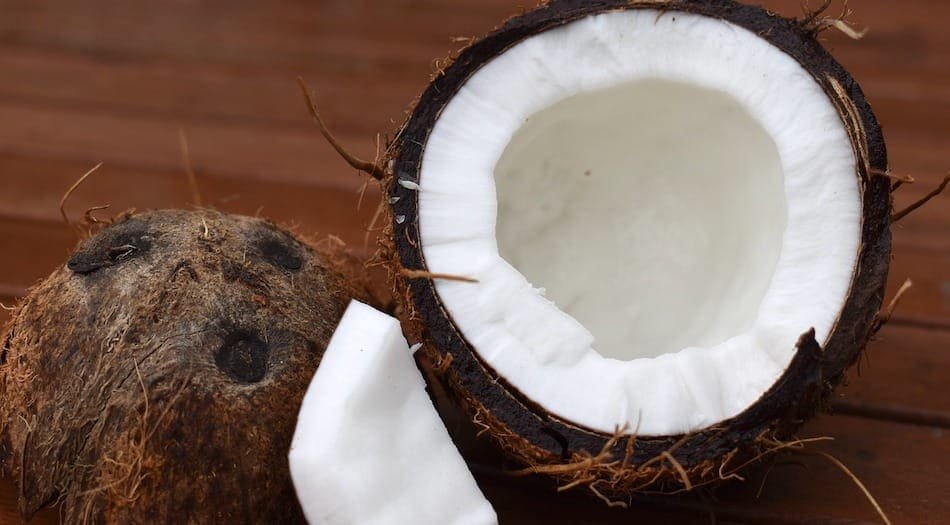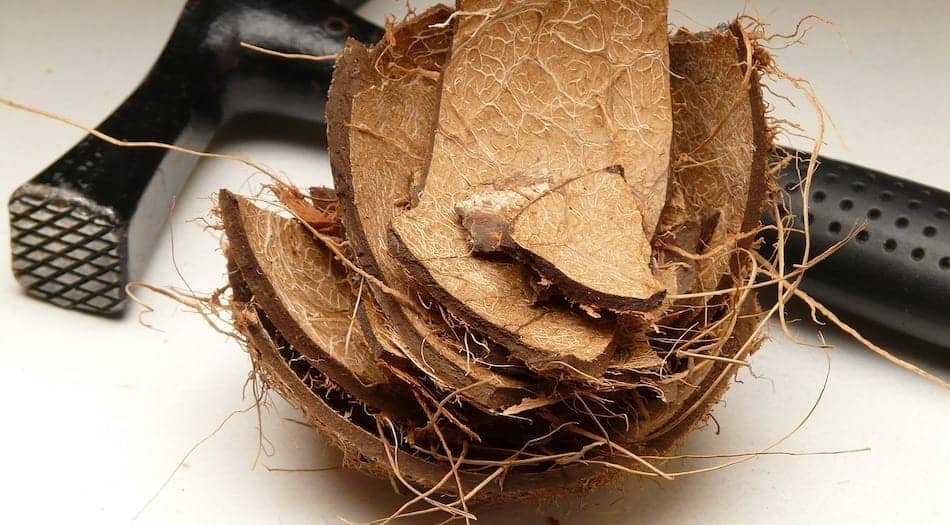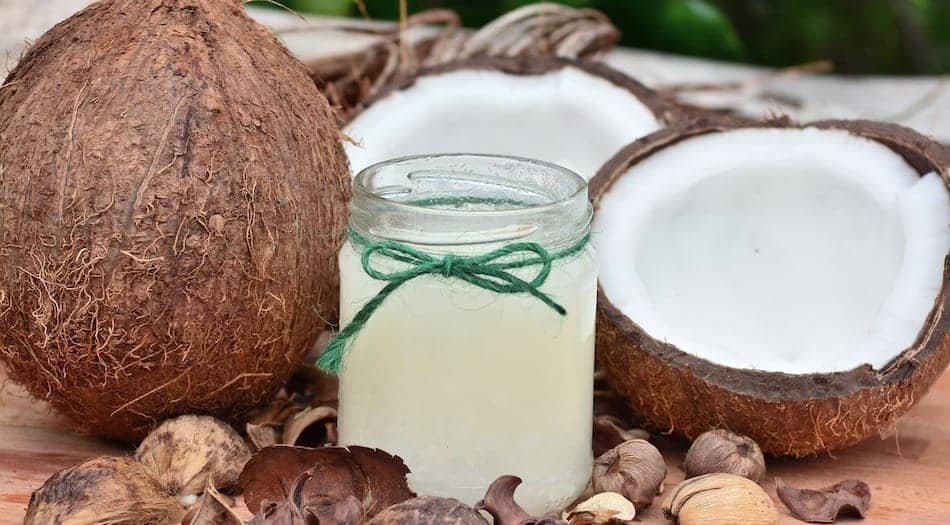The delicious smell and taste of coconut means that it has found its way into everything from health foods to beauty products, because of its natural sweetness and myriad of health benefits. But as you enjoy your coconut-infused treats, you might be wondering, can dogs eat coconut? The answer is yes, dogs can eat coconut, but there are some precautions to keep your pet safe, so read on to discover the details.

Before introducing any new foods to your dog’s diet, always consult your vet. Individual dogs may have different intolerances, dietary needs, and health considerations. This article is not a substitute for professional veterinary advice.
Benefits of Coconut for Dogs
Incorporating coconut into your dog’s diet can offer various health benefits to contribute to their overall well-being because it offers a host of nutrients including:
- Vitamin Bs
- Vitamin C
- Vitamin E
- Iron
- Magnesium
- Potassium
- Zinc
- Antioxidants
- Fiber
- Low in carbohydrates
Coconut offers a myriad of benefits for dogs.
Boosting the Immune System
Coconut is packed with lauric acid, a fatty acid known for its antimicrobial and antiviral properties, helping to combat bacteria, viruses, and fungi that can compromise the immune system. It can help fight off infections and improve gut health in dogs, and skin infections, improving the skin’s barrier function.
The antioxidants in coconut oil can combat free radicals, reducing oxidative stress, inflammation and supporting a healthy heart and joints.
Promoting Healthy Skin and Coat
Coconut’s moisturizing properties can also alleviate dry skin issues, leaving your dog with a shiny, lustrous coat.
Helping with Digestive Health
The fiber content in coconut aids in digestion, regulates bowel movements, and may help prevent issues like constipation or digestive discomfort.
Coconut oil contains medium-chain triglycerides (MCTs) which are easily digestible and can provide a quick source of energy for your furry friend. This can be particularly beneficial for dogs with sensitive stomachs or digestive issues.
Hydrating Benefits
Coconut water is also a great natural electrolyte, helping to keep your furry friend hydrated and replenishing essential minerals.

Risks of Feeding Coconut to Dogs
While coconut offers many health benefits, it’s important to be aware of the potential risks associated with feeding this fruit to dogs.
High Fat Content
One of the main risks associated with feeding coconut to dogs is its high fat content. Excessive consumption of fatty acids in coconut products can lead to weight gain, obesity, and potentially contribute to health issues like pancreatitis or elevated cholesterol levels.
Risk of Pancreatitis
The pancreas plays an important role in producing digestive enzymes, and an excess of fat intake can strain its functionality. This leads to a higher likelihood of pancreatitis, a condition characterized by the inflammation of the pancreas.
Dogs with a history of gastrointestinal problems or those who are overweight are at an increased risk of developing pancreatitis after ingesting foods like coconut. The added stress on the pancreas due to the digestive implications of coconut consumption can exacerbate existing health issues in these animals.
Potential Choking Hazard
Another risk of feeding coconut to dogs is the potential choking hazard posed by certain coconut parts. Coconut shells and fibers could lead to choking or create blockages in their digestive system, especially if they are given coconut in its natural form without being properly prepared. These blockages can be life-threatening and may require immediate veterinary intervention.

How Much Coconut Can Dogs Eat?
While coconut is non-toxic to dogs in it’s raw, unprocessed state, and can offer some health benefits, moderation is imperative due to its high saturated fat content to avoid strain on the digestive system, as overindulgence can lead to an upset stomach and diarrhea. Dogs with underlying health conditions like pancreatitis or obesity are even more susceptible to the negative effects of excess fat intake, and you should consult your vet before feeding coconut to your dog with such conditions.
The quantity depends on the size of your dog. For dogs with no health conditions or food intolerances it is generally recommended that smaller dogs have no more than half a teaspoon of coconut meat and up to 1 1/2 teaspoons for large dogs.
How to Safely Feed Coconut to Dogs
Most dogs can generally enjoy coconut, without problem but it’s important to be vigilant for any signs of digestive upset or intolerance, such as diarrhea or vomiting when first introducing it. If you notice any adverse reactions, discontinue feeding coconut and consult your veterinarian immediately.
Opt for plain, raw, unsweetened coconut to ensure your dog receives the nutritional benefits without any unnecessary additives.
Clean the coconut meat off the outer shell, husk and fibres before giving it to your dog, to avoid internal cuts or blockages.
Avoid pairing coconut with other high-fat foods or treats, as this can lead to extra strain on the gastrointestinal system.
FAQs
Is Coconut Safe for Dogs to Eat?
Coconut is a nutritious treat that can offer various health benefits for your furry companions. It can promote a healthy coat, improve digestion, and boost overall immune function in dogs. However excessive consumption may lead to gastrointestinal distress, such as diarrhea or stomach upset. Be sure to remove all hard and fibrous parts like the outer shell and husks before offering coconut to Fido.
What Parts of the Coconut are Safe for Dogs?
Healthy dogs can generally enjoy coconut meat and coconut water as part of their diet without significant adverse effects. It can provide them with a healthy source of essential fats, proteins and nutrients improving overall health when fed in small amounts.
What Parts of the Coconut are Dangerous for Dogs?
There outer coconut shell and fibrous husks pose choking hazards to dogs and can also potentially cause dental damage and blockages in their digestive system.
Can Dogs Eat Raw Coconut?
Yes, dogs can eat raw coconut meat in moderation. Raw coconut flesh contains healthy fats, fiber, and nutrients that can benefit your dog’s health. However, it’s high fat content may not be suitable for dogs with certain health conditions like obesity and pancreatitis. If you are unsure first consult your vet. It is important to remove the outer shell and ensure that the pieces of coconut meat are small enough to avoid choking hazards.
Can Dogs Have Coconut Water?
Yes, dogs can have coconut water in small amounts. Coconut water is rich in electrolytes and can be a hydrating treat. However, due to its natural sugar content, it should be given sparingly.

Can Dogs Have Coconut Milk?
Dogs can have coconut milk in moderation, but it should be unsweetened and free from additives. Commercial coconut milk often have additives which may be of concern, so be sure to check the ingredients. Coconut milk is high in fat, so it should be given as an occasional treat rather than a regular part of their diet.
Can Dogs Have Desiccated Coconut?
Yes, dogs can eat desiccated coconut in small amounts. Desiccated coconut is simply dried coconut meat. Ensure it is unsweetened and with no other additives. Give in moderation to avoid digestive issues.
Can Dogs Eat Coconut Flakes?
Yes, dogs can eat coconut flakes if they are unsweetened and given in small quantities. Coconut flakes can be a tasty addition to their diet but should be monitored to prevent over consumption.
Can Dogs Eat Coconut Flour?
Yes, dogs can eat coconut flour. It can be used in homemade dog treats as a gluten-free alternative to wheat flour. Coconut flour is high in fiber, so it should be introduced gradually to avoid digestive upset.
Can Dogs Eat Coconut Oil?
Yes, dogs can eat coconut oil. It can be beneficial for their coat, skin, and overall health when given in moderation but can lead to weight gain if too much is given. as for coconut flesh, consult with your vet if at all unsure.
Can Dogs Eat Coconut Sugar?
Coconut sugar should generally be avoided for dogs. While it is a natural sugar, it is still sugar, and excessive sugar intake can lead to health problems such as obesity, dental issues, and more.
Can My Dog Chew on a Coconut Shell?
It’s not recommended for dogs to chew on coconut shells. The hard shell can be a choking hazard and might cause damage to your dog’s gums, teeth, or digestive tract if swallowed.
Does Coconut Get Rid of Worms In Dogs?
There is no scientific evidence to support the claim that coconut can get rid of worms in dogs. If you suspect your dog has worms, it’s best to consult your veterinarian for appropriate treatment.
Is A Coconut a Good Toy for Dogs?
A whole coconut might seem like a fun toy, but it’s not recommended due to the hard shell and fibrous husk, which can be choking hazards and cause dental damage. Instead, opt for dog-safe toys specifically designed for chewing.
Final Thoughts on Can Dogs Eat Coconut?
Yes, dogs can eat coconut and it can provide a number of nutrients and health benefits to dogs, however responsible feeding practices are essential to ensure your dog’s well-being. Note that not all dogs may react positively to coconut consumption. Some might experience gastrointestinal upset especially with over consumption, and dogs suffering from obesity or pancreatitis should avoid coconut. Always consult with a vet before making significant changes to your dog’s diet, including introducing new foods. While coconut does offer nutritional benefits it should not replace a balanced and complete diet formulated for your dog’s specific nutritional needs.





